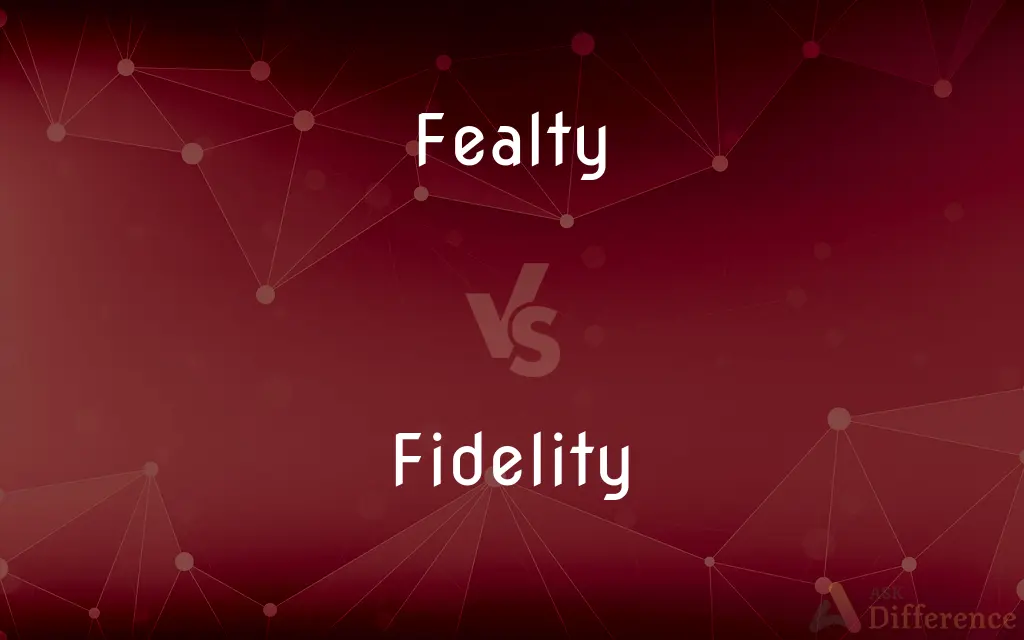Fealty vs. Fidelity — What's the Difference?
By Urooj Arif & Maham Liaqat — Updated on April 24, 2024
Fealty refers specifically to a sworn loyalty, often historical and linked to feudal obligations, whereas fidelity encompasses a broader loyalty or faithfulness, applicable in relationships and ideologies.

Difference Between Fealty and Fidelity
Table of Contents
ADVERTISEMENT
Key Differences
Fealty originates from medieval times, primarily used to describe a vassal's sworn loyalty to a lord under the feudal system. In contrast, fidelity is a more general term for faithfulness and loyalty in various contexts, including personal relationships and commitments to causes or beliefs.
The concept of fealty is steeped in history and often associated with formal ceremonies where oaths were taken. On the other hand, fidelity can be observed in everyday actions and decisions, reflecting adherence to ethical, moral, or personal standards without the necessity of a formal pledge.
Fealty was crucial in maintaining the social and political structures of feudal societies. It involved specific duties and obligations that were legally binding. Whereas fidelity, although it can involve legal or moral obligations, is often governed more by personal conviction and the intrinsic values of the individuals involved.
The usage of fealty has become relatively rare and is mostly found in historical or literary contexts. Conversely, fidelity remains a common concept, widely applicable and referenced in legal, social, and personal spheres.
While fealty specifically requires an element of subordination to a higher authority, fidelity might not imply any hierarchy and can exist mutually between parties, as seen in marriages or among equals in a cause.
ADVERTISEMENT
Comparison Chart
Definition
Loyalty sworn to a superior
Faithfulness or loyalty
Context
Historical, feudal system
Broad, including personal and ideological
Formality
Often formal and ceremonial
Can be formal or informal
Legal Binding
Legally binding in feudal context
May or may not be legally binding
Common Usage
Rare, mostly historical
Common in various contexts
Compare with Definitions
Fealty
Historically specific to feudal legal obligations.
Fealty involved specific duties towards the lord, including military support.
Fidelity
Loyalty and faithfulness to a spouse, organization, or cause.
His fidelity to the company was recognized with a loyalty award.
Fealty
Involves a formal pledge or oath.
Fealty was declared through a formal oath of allegiance.
Fidelity
Encompasses moral and ethical adherence.
She demonstrated her fidelity to the truth, even under pressure.
Fealty
Reflects a hierarchical relationship.
The concept of fealty is inherently tied to a hierarchy between lord and vassal.
Fidelity
Can exist without formal declarations.
Their mutual fidelity was understood and didn’t need to be formally stated.
Fealty
Rarely used in modern legal contexts.
Modern contracts rarely require an oath of fealty, focusing instead on legal terms.
Fidelity
Applicable in personal and professional relationships.
Maintaining fidelity in a partnership is crucial for trust.
Fealty
A feudal tenant's or vassal's sworn loyalty to a lord.
The knight pledged his fealty to the king during the ceremony.
Fidelity
Often part of legal and personal commitments.
The contract stipulates fidelity to the agreed-upon terms.
Fealty
An oath of fealty, from the Latin fidelitas (faithfulness), is a pledge of allegiance of one person to another.
Fidelity
Fidelity is the quality of faithfulness or loyalty. Its original meaning regarded duty in a broader sense than the related concept of fealty.
Fealty
A feudal tenant's or vassal's sworn loyalty to a lord
They owed fealty to the Earl rather than the King
Fidelity
Faithfulness to obligations, duties, or observances.
Fealty
The fidelity owed by a vassal to his feudal lord.
Fidelity
Exact correspondence with fact or with a given quality, condition, or event; accuracy
The fidelity of the movie to the book.
Fealty
The oath of such fidelity.
Fidelity
The degree to which an electronic system accurately reproduces the sound or image of its input signal.
Fealty
Allegiance.
Fidelity
Faithfulness to one's duties.
The fidelity of the civil servants
Fealty
Fidelity to one's lord or master; the feudal obligation by which the tenant or vassal was bound to be faithful to his lord.
Fidelity
Loyalty to one's spouse or partner, including abstention from cheating or extramarital affairs.
Fealty
The oath by which this obligation was assumed.
Fidelity
Accuracy, or exact correspondence to some given quality or fact.
Fealty
Fidelity to one's lord; the feudal obligation by which the tenant or vassal was bound to be faithful to his lord; the special oath by which this obligation was assumed; fidelity to a superior power, or to a government; loyality. It is no longer the practice to exact the performance of fealty, as a feudal obligation.
Fidelity
The degree to which a system accurately reproduces an input.
Fealty
Fidelity; constancy; faithfulness, as of a friend to a friend, or of a wife to her husband.
He should maintain fealty to God.
Makes wicked lightnings of her eyes, and sapsThe fealty of our friends.
Swore fealty to the new government.
Fidelity
Faithfulness; adherence to right; careful and exact observance of duty, or discharge of obligations.
Whose courageous fidelity was proof to all danger.
The best security for the fidelity of men is to make interest coincide with duty.
Fealty
The loyalty that citizens owe to their country (or subjects to their sovereign)
Fidelity
Adherence to the marriage contract.
The principal thing required in a witness is fidelity.
Fidelity
Accuracy with which an electronic system reproduces the sound or image of its input signal
Fidelity
The quality of being faithful
Common Curiosities
What is fealty?
Fealty is a sworn loyalty, typically from a vassal to a lord in a feudal context.
How are fealty and fidelity different?
Fealty is specific to historical and feudal loyalty with formal oaths, whereas fidelity is a broader term for loyalty and faithfulness in various contexts.
Can fidelity exist without formal oaths?
Yes, fidelity often exists based on personal ethics and values, without the need for formal oaths.
What happens if fealty is broken?
In historical contexts, breaking fealty could lead to legal repercussions or loss of land and titles.
Are there modern equivalents to fealty?
Modern legal contracts can reflect elements of fealty in terms of strict adherence to agreed terms.
What literary works feature themes of fealty?
Fealty is a common theme in medieval literature, such as in Arthurian legends.
What does fidelity mean?
Fidelity refers to faithfulness or loyalty in relationships, ideologies, or commitments.
Is fealty still relevant today?
Fealty is mostly of historical interest and rarely applicable in modern legal or social structures.
Can organizations require fidelity?
Yes, organizations can expect fidelity in terms of loyalty and adherence to their rules or codes.
Can fidelity be legally enforced?
In some contexts, aspects of fidelity, like non-disclosure agreements, can be legally enforced.
Does fealty imply inequality?
Yes, fealty involves a hierarchical relationship, typically between a lord and a vassal.
What are examples of fidelity in everyday life?
Examples include being faithful to a spouse, loyal to a company, or adherent to a personal cause.
How is fidelity expressed in marriage?
Fidelity in marriage involves being faithful and loyal to one’s spouse.
Why is fidelity important in relationships?
Fidelity builds trust and stability in relationships.
How does fidelity impact societal norms?
Fidelity influences societal norms by setting standards for personal and communal loyalty and ethics.
Share Your Discovery

Previous Comparison
Archaeology vs. Archeology
Next Comparison
Preimage vs. ImageAuthor Spotlight
Written by
Urooj ArifUrooj is a skilled content writer at Ask Difference, known for her exceptional ability to simplify complex topics into engaging and informative content. With a passion for research and a flair for clear, concise writing, she consistently delivers articles that resonate with our diverse audience.
Co-written by
Maham Liaqat













































